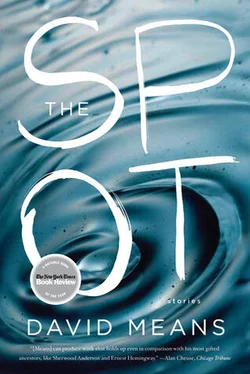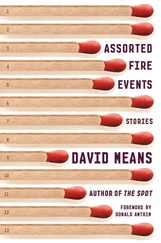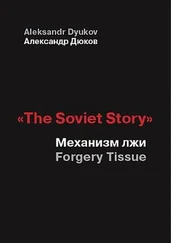They went down toward the river, cutting off the promenade along a thin dusty path through the weeds. He let her go a few yards ahead so he could watch her hips shifting beneath her skirt, the movement of her rear against the silk fabric, light- and dark-blue daisy-shaped flowers. There was that helplessness in her movement — from her pumps on the unsteady ground — that he enjoyed, a sense that she might tumble at any moment, and she did, twisting sideways to the right with a small grunt, and falling into the weeds.
The bone was broken — a spiral fracture — just above her ankle. With her arm around his shoulder, and his arm around hers, they hobbled up the path, along the promenade, to Riverside Drive, where they hailed a cab and went all the way up to Columbia Presbyterian Hospital.
In his apartment — cool with blue twilight — she lay on his bed while he ran his fingers along the soft cotton gauze, against the fiberglass, that spot where the two met. He’d remember that forever. His finger going up and in against the warmth of her foot, slipping as far as it would go.

On the way to the car, I was stepping off the curb and twisted it and the bone bore the brunt, she explained to her husband. I got a cab to this hospital and then went back to get my bag from the car. The story felt frail and feeble, like old lace; it had the gaping open spaces you’d expect, although it was made carefully, with consideration of all the angles. He chose to believe it. He let his compassion — his duty as a good husband — slip like mortar between the cracks. Much later he’d examine his foolishness and think: I was as complicit as she was in that story, driving in to pick her up, finding her standing up, leaning against the car.
A fetid, oily smell emerged from beneath the cast: sweat, dead skin, and dirt. Afternoons, she lay on a divan in the back room and read Tolstoy.
The way bone heals, calcifying and thickening and becoming stronger. The knob of new bone you can feel against the skin. The elation of the cast being removed, the saw touching the skin but not cutting, the sudden sensation of freedom.
Summer was deep and warm. Behind them the office building, with its reflective glass, collected and cubed the vista. The great terminus of parting; the deep, elegiac tragedy of it. The upstate reservoirs had been depleted by the heat wave, their dirty skirts powdered with dried algae and muck. Spray caps were attached to the fireplugs, unleashing thin, tight streams, until the kids removed the caps with lug wrenches. The dry silence of a late Friday in early July. Broadway, visible from the corner, was strangely empty.

Never mutual, the fact that one must suffer more than the other, however preordained, seemed startling. Ginkgo nuts fell early from trees along Claremont Avenue — the drought had urged the season forward — and a man collected them in a cloth sack, working slowly in the heat, plucking them up one at a time.
Her explanation was stilted: First she talked about her marriage and her daughter and the fact that she was not willing to give these things up, to let them go, and then, fumbling for something more specific, she said, I went last night to check my daughter, and she was uncovered and sleeping facedown and I looked at her back, the bones of her back, and they were, well, they reminded me of the bones of a sardine. You could chew and swallow them and not even notice.
I believed it myself when I told him that, she said to a friend.
To go back to Chekhov: the torment of it, the way it was rooted in place — the hot winds of Yalta, the wintry streets of Moscow. In her case it was the long stretch of riverfront at the end of the yard at home: then the gray spans of the bridge, with the city, down to the right, stretched lengthwise into the summer haze.
The potential was there for a long time: He’d show up in her town, unexpectedly, standing with his hands stuffed deep into his pockets, or at Lincoln Center, as he had proposed, during intermission, the next tier down, spotted through the glass railing, looking, searching.
Much later, she’d hold specific memories of it: the clandestine ventures out into the night; the way the grid of north-south streets seemed to contain them, walking hand in hand down Columbus in the fall, dressed in sweaters, relishing the itch of the wool. A man had been selling cashmere scarves from a sheet of cardboard near the Plaza Hotel. He’d bought one and lifted it gently around her neck.
Weirdly enough, I lied and told him my daughter was sixteen, and troubled, she admitted to a friend. I added four years to my own daughter’s life and didn’t know why I was doing it at the time.
There was deliberation at the deepest level, even in the falling away, the parting, the bitterness. There was an inelegance. No matter how fanciful and wild, no matter how impulsive, in retrospect it had stood within the fact of the marriage itself. Still, she beheld a certain dignity in the exactitudes: the smell of cut flowers at a bodega, rubber bands bright red around their stems; the dusky light off Broadway on summer afternoons; the heavy wall along Riverside Park, cool against their calves, as they sat holding hands during lunch, turning now and then to glance down through the trees to the river, which was broken up into shards, a deep blue against the green.
Facts Toward Understanding the Spontaneous Human Combustion of Errol McGee
The Fire
A violet rashlike spume of vapors circumnavigated his ankles and then spread over his shins — freckled, smeared with age spots — until, reaching the conflagration point, he burst into a senseless mass of orange flame. Presumably he didn’t writhe or squirm because by the time the fire hit (or perhaps before) he was unconscious. The position of his chair indicates that he probably had his heels up on the windowsill. Staring off at the lake with his feet up, the bottle tucked in his crotch, he was resting in a wicker chair, which of course remained miraculously unscorched. People found the things that weren’t burned astonishing: the chair, the curtains, the porch, the cottage itself. Above his skull, on the ceiling over the chair, a large blister of seared paint had formed. The first fireman on the scene couldn’t help himself. He popped it with the tip of his ax.
The Skull
There’s the undeniable physical reality of the evidence: the skull, cleaned of flesh, resting on the green seat cushion; window curtains — blue swirls of highly flammable Dacron — twisting in the lake breeze, perfectly intact after the conflagration, not even a singe except where, years ago, McGee’s ex-wife had let the iron rest a little too long. Again, the ceiling blister, so obviously the result of aggressive heat, but still only a blister. (Admittedly, the ceiling tiles had some asbestos fibers to retard fire, but not enough to prevent flames from driving through to ignite the furring strips and up into the dry-baked rafters. Presumably, a fire that was hot enough to carbonize bone — with the weird exception of the skull — would be enough to ignite a structure. Too neat, the fireman thought, seeing it. Too damn tidy.)
General Conditions
Full S.H.C. events leave nothing but a very faint trace of ash and a shadow of the deceased, if even that, and in rare cases a lamina of glass coating the object upon which the victim (for lack of a better way to put it) stood, sat, or reclined. Most often the victim is seated with some view or vista at hand: a lakeside or seashore or the broad expanse of some grand river, and in rare cases a wide field, or a savanna, and in even rarer cases no view at all except a television screen, in which instance the device is invariably implicated as the cause — or spark — of the event: blame placed willy-nilly, in the grope for an explanation, squarely on the shoulders of the boob tube (as it was called) and its ability to create flashes of stupid heat, produced out of the dull vagaries of mind-numb sitting when — the theory goes — all deep thoughts are purged to leave a void that is quickly filled with a flux of bodily processes: regiments of cells rebelling against a vegetative state and going haywire as they break into a symbiotic self-eating festival. A somewhat absurd reaction, admittedly, but perhaps justified, depending on the view.
Читать дальше














